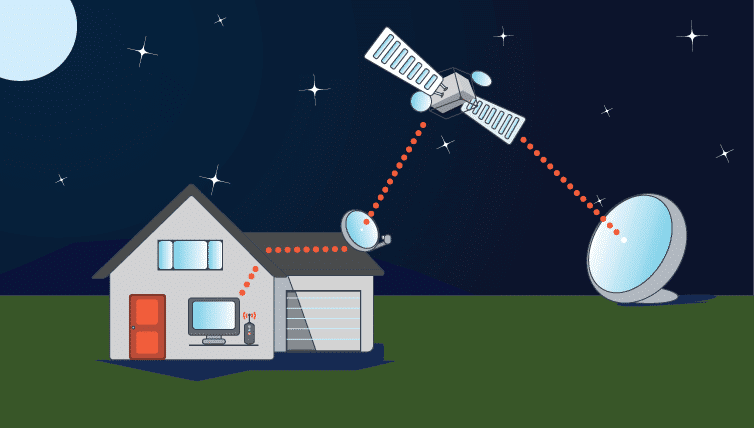The conversation about satellite internet service has been negative for a long time. But the conversation is changing because of recent innovation and since it may be the key to connecting the world in the near future.
With these changes in mind, let us consider the advantage and disadvantages of satellite internet.
What Is Satellite Internet?

Cable internet involves transmitting data through copper wires. Fiber internet uses fiber-optic cables which Spectrum internet provides to its subscribers, and fixed wireless and cellular services transmit data over radio waves. Satellite internet beams data between a satellite in space and a satellite dish here on Earth.
Companies like HughesNet and Viasat have traditionally used fixed-position satellites. In other words, their orbit is synced with the orbit of the Earth. But Starlink is an example of one of the companies changing satellite internet. It is launching satellites that have their own orbit around the Earth, which improves coverage significantly.
Con: Satellite Internet Is Expensive
The satellite has traditionally been expensive compared to other internet options. This is true when considering the fixed price you pay each month but also when evaluating how much you are paying per Mbps.
Services like Starlink will be less expensive relatively. However, Starlink requires a $500 upfront equipment cost and will cost about $100 a month, and that is still rather expensive for the average consumer.
Pro: Satellite Internet Is Available Almost Anywhere
In the U.S., you have access to satellite internet in most—but not all—rural regions and something is often better than nothing. SpaceX is continuing to launch satellites.
They will soon be joined by Amazon, OneWeb, and Boeing, and the day when service is available everywhere is not far off.
Con: Weather Can Affect Signal
This problem has not been completely solved. Inclement weather can interrupt service, and Starlink actually recommends to its beta testers to bring their equipment inside if a storm is bad enough.
Pro: Speeds Greater Than Broadband Possible
HughesNet and Viasat already deliver broadband, which is at least 25 Mbps download. In its beta program, Starlink is already matching cable speeds at 100 Mbps and above, and SpaceX CEO Elon Musk asserts that it will eventually reach fiber-level speeds as the satellite constellation evolves.
Con: Low Bandwidth
While this con will fade with time starting soon, Starlink is still in beta. It does not go public until 2022. In the meantime, providers like Viasat and HughesNet offer low bandwidth. The FCC set the milestone for bandwidth a long time ago. It now suggests that the average home needs 100 Mbps at least.
Pro: No Long-Term Outages
Cable is the worst when it comes to outages. A severe storm can knock out cable internet for days and even weeks. As long as the dish is not damaged, the satellite can recover as soon as the storm subsides. It does require electricity, but there are options, such as backup generators and batteries.
Con: Poor Latency
Here is another issue that will go away soon. Starlink already has latencies comparable to cable. But traditional satellite has a high ping, and that makes it less than ideal for online gaming and any other internet activities that require a real-time exchange of data.
Pro: Reliability
Weather can be an issue, but outside of that potential problem, satellite internet is very reliable. According to industry statistics, it is more reliable than cable, DSL, fixed wireless, and cellular.
A Changing Conversation
The hardest part about weighing the pros and cons of satellite internet right now is that the industry is undergoing a great deal of change.
Within 12 months of this article being published, we may have to evaluate the cons, and as the new competitive landscape takes shape, we may have to reevaluate the pros too.



